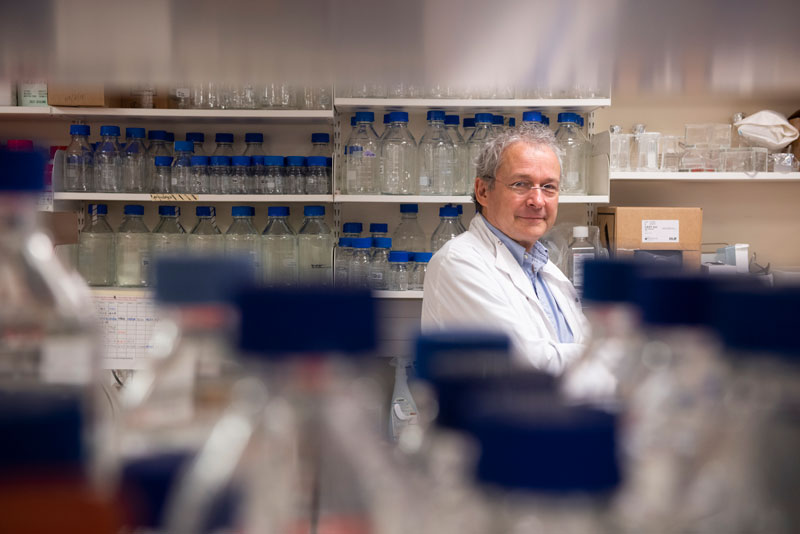The potential of regenerative medicine
Our understanding of common conditions affecting the heart, brain and immune system is set to grow with the establishment of the Institute of Developmental and Regenerative Medicine, which will sit in the new IMS-Tetsuya Nakamura Building.
How are organs formed before birth? How do we become functioning individuals that have a possible lifespan of tens of years ahead of us? And, if things go wrong, how can those organs be repaired?
Hoffmann and Action Medical Research Professor of Developmental Medicine Georg Holländer became involved in paediatrics to try to understand such questions. His area of research is focused on the immune system, and specifically the thymus, which serves a vital role in developing cells that defend the body from potentially deadly pathogens, such as bacteria, viruses and fungi.
‘If we could identify the stem cells essential to form a thymus and transplant them or re-stimulate their growth to form healthy tissue again, then we would have a new therapy for a number of conditions,’ he says. ‘These include reduced responses to vaccines, due to immune system deficiencies; a higher susceptibility to cancer; and an increased weakness to fight infections effectively with advanced age.’
Professor Holländer’s work is at the cutting edge of regenerative medicine, a relatively new discipline underpinned by developmental biology: the study of genetic mechanisms that result in the normal formation and maintenance of tissues and organs during foetal development and early life. Recent advances in this area involve reactivating cells to restore function after injury or disease, potentially revolutionising treatment for disorders of the heart, the brain and the immune system in patients of all ages.
To accommodate the great strides being made in this area, Oxford will establish the Institute of Developmental and Regenerative Medicine in 2021. Its formation has been led by Professor Holländer, along with Paul R Riley, British Heart Foundation Professor of Regenerative Medicine and Chair of Development and Cell Biology, and Matthew Wood, Professor of Neuroscience.
‘ I have been very fortunate to work with different philanthropists. Those that have given to Oxford see that their contributions really make a difference’
At a total cost of £35 million, the institute has been made possible by generous gifts from the British Heart Foundation and philanthropist Dr Tetsuya Nakamura (Itabashi Medical System Group CEO) and his foundation. André Hoffmann and Action Medical Research have also invested in the creation of the endowed professorship that Professor Holländer currently occupies. ‘It is very good to know that the work we are doing in this exciting area of biomedicine is able to be realised with the generous support of donors,’ he says.
Professor Holländer is very clear on the reasons why Oxford is able to attract such significant donations: ‘Oxford’s history in medical sciences is an assurance that what’s being done is forward-looking, and the added value is more than the sum of its different parts – much more. The freedom that individuals have to pursue their intellectual interests, and the rigour with which the academic community, in a friendly but very sophisticated way, interrogates their work, helps to create enormously rich and highly accomplished outputs.’
With two to three children out of every 1,000 live births suffering from central nervous system malformation, and with deaths from heart and circulatory diseases among people under 75 on the rise for the first time in 50 years, there is a huge demand and need for therapeutic breakthroughs.
 Professor Holländer in the lab. Photo by John Cairns.
Professor Holländer in the lab. Photo by John Cairns.
The institute’s research will not provide therapies immediately, but Professor Holländer is convinced that they will come in time – along with accompanying economic and ethical questions. ‘In the past, a regenerative therapy was either not possible or, when it was, the cost could be absorbed,’ he says. ‘Now, with many more therapies with good success rates and potentially large price tags becoming available, we need to find a different way to make sure that there is uptake and adoption of them, not only in wealthy regions, but also in low- and middle-income countries.’
First and foremost, however, Professor Holländer says that the institute’s role will be to generate new knowledge: ‘The benefit to the patient is that the 200+ researchers coming together in the new institute are looking at different diseases, such as common conditions like myocardial infarction, and how the heart muscle can be repaired by forming new tissue.’
Professor Holländer’s interest in seeking answers to complex questions continues unabated, and is further enriched by a strong sense of professional community. ‘The research domain where I work is a kind of global family,’ he says. ‘It is an area that has brought together a group of very inquisitive, friendly, engaging individuals. It is a great environment in which to do what we are doing.’
GIVE TO MEDICAL SCIENCES